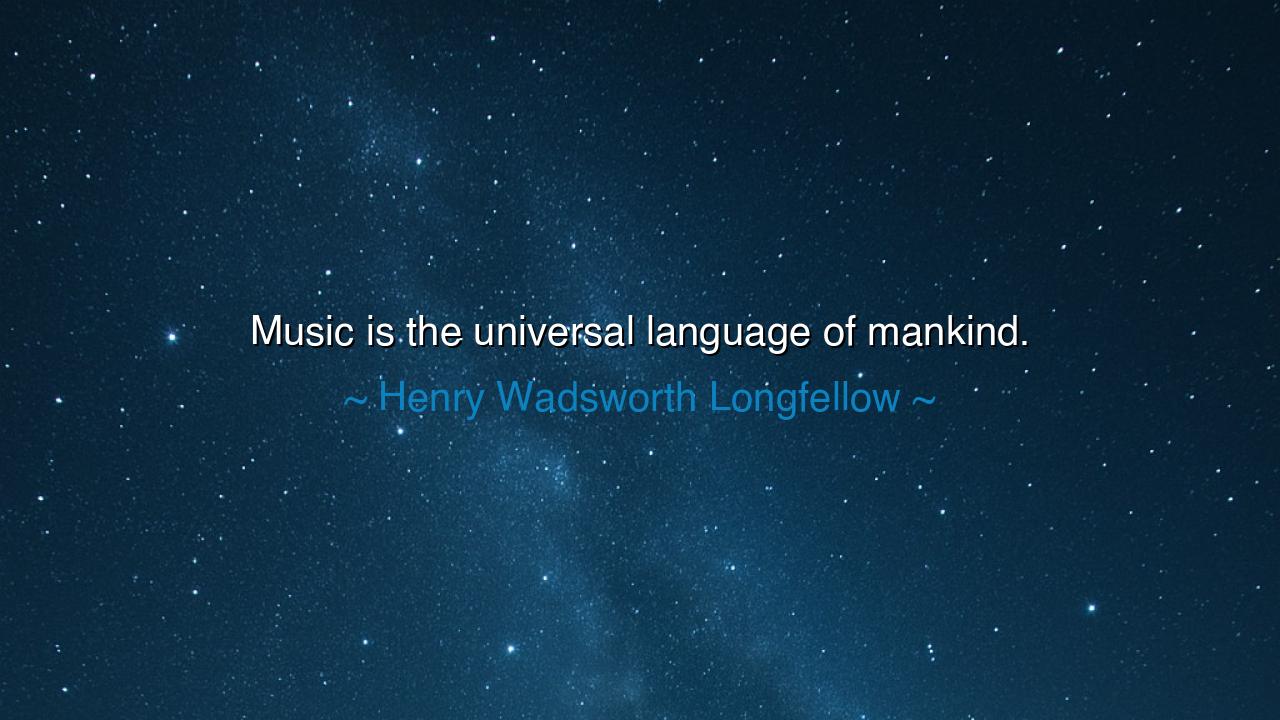
Music is the universal language of mankind.






Hear the immortal words of Henry Wadsworth Longfellow, poet of the people and voice of America’s heart: “Music is the universal language of mankind.” In this declaration, he speaks of a truth as old as creation itself—that while tongues divide and nations clash, music speaks across every boundary, every barrier, every difference. For melody needs no translation, rhythm asks for no interpreter, and harmony reaches the soul of every man, woman, and child alike.
To call music universal is to recognize it as the inheritance of all humanity. Every culture, every tribe, every age has lifted its voice in song, from the drumbeats of Africa to the flutes of China, from the chants of the monks to the hymns of cathedrals. Though the words differ, the spirit is one. A mother’s lullaby in India can soothe the child of Greece; the cry of the violin in Russia can stir the same tears in the eyes of a stranger in Mexico. Thus Longfellow reminds us that beyond speech, beyond custom, there is a language of the heart—music—that unites mankind.
The ancients knew this well. The Greeks told of Orpheus, whose lyre could charm even the stones and beasts, whose song could move the very gods of the underworld. To them, music was not mere sound, but a cosmic force that bound creation together. The Hebrews, too, lifted psalms unto heaven, knowing that when words failed, music carried prayers where speech could not go. In every tradition, music was seen as a bridge between the human and the divine, the individual and the collective.
History shows us its power to unify even in times of strife. Recall the Christmas Truce of 1914, when soldiers entrenched in war heard carols rise across the battlefield. Enemies who hours earlier had raised rifles against each other joined in the same hymn—Silent Night. In that moment, they discovered what Longfellow proclaimed: that music speaks to what is human in us all, dissolving hatred and reminding us of our shared nature.
Or consider the story of Beethoven, deaf yet composing the Ninth Symphony. In its final movement, voices rise together in Schiller’s Ode to Joy, calling for unity and brotherhood. To this day, the same music is sung in cathedrals, in concert halls, and at great gatherings across nations. No words are needed to explain it, for all who hear feel its power. This, too, is Longfellow’s wisdom: music communicates what words cannot.
The meaning of his words is both profound and practical. In a world divided by creed, by language, by nation, we must remember that music is a thread of unity. It reminds us that beneath our differences, we share the same heartbeats, the same longings, the same griefs and joys. Where debate hardens hearts, music softens them. Where speech falls short, music completes the message. It is the language of mankind, because it is the voice of the soul itself.
Therefore, beloved seeker, let this wisdom guide you: do not treat music as mere entertainment, but as sacred connection. Listen to the songs of other peoples and let them open your heart to their humanity. Share your own songs, not as boasts, but as offerings of peace. When conflict rises, let music remind you of the unity that strife seeks to destroy. And when words are not enough, let melody speak for you.
And so, remember Longfellow’s words: music is the universal language of mankind. Let it be your companion, your teacher, your bridge to others. Sing when you rejoice, sing when you weep, sing when you long for peace, for in song you join a chorus that began before time and will echo long after your voice is gone. In that chorus, you are never alone—for in music, all mankind speaks as one.






AAdministratorAdministrator
Welcome, honored guests. Please leave a comment, we will respond soon